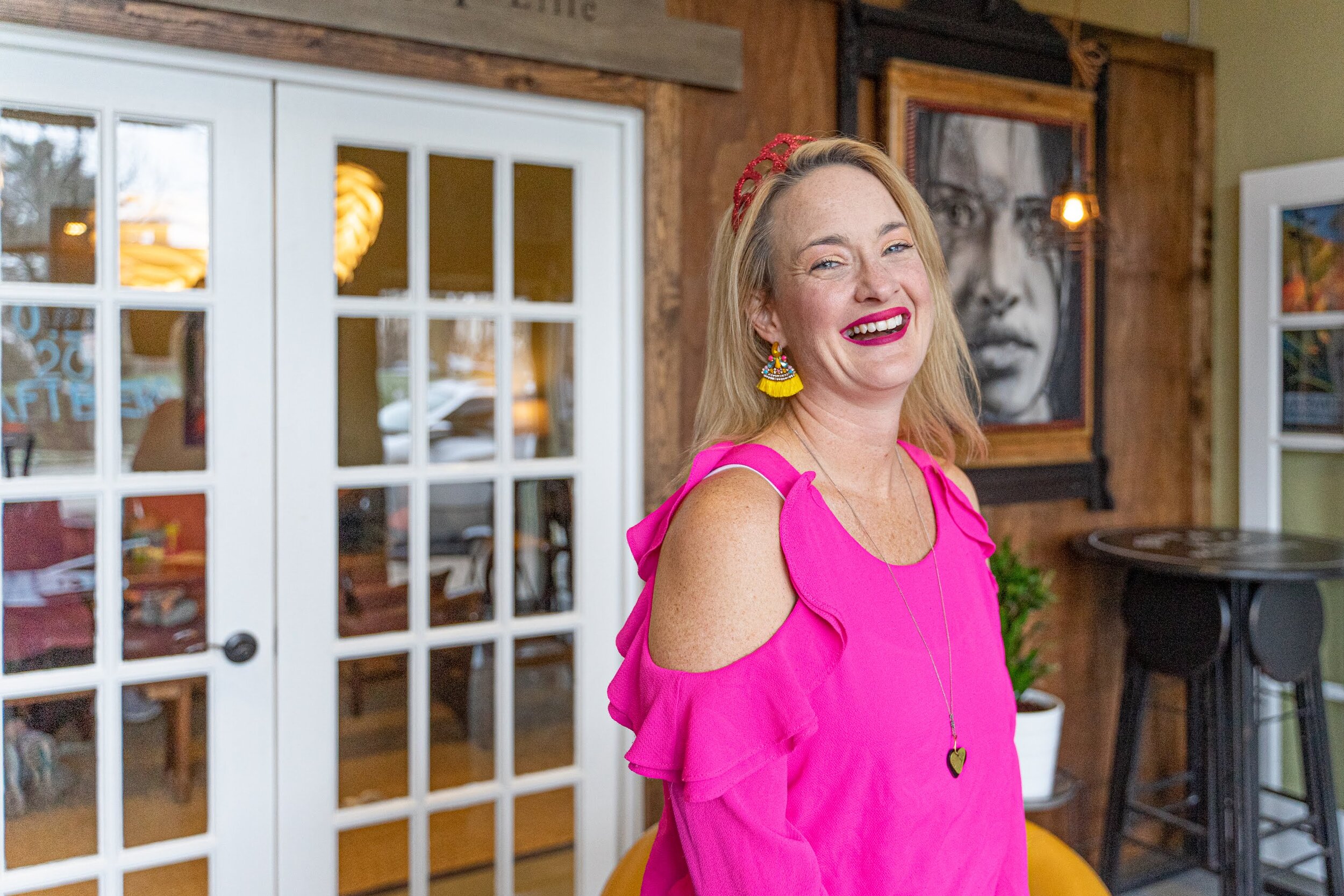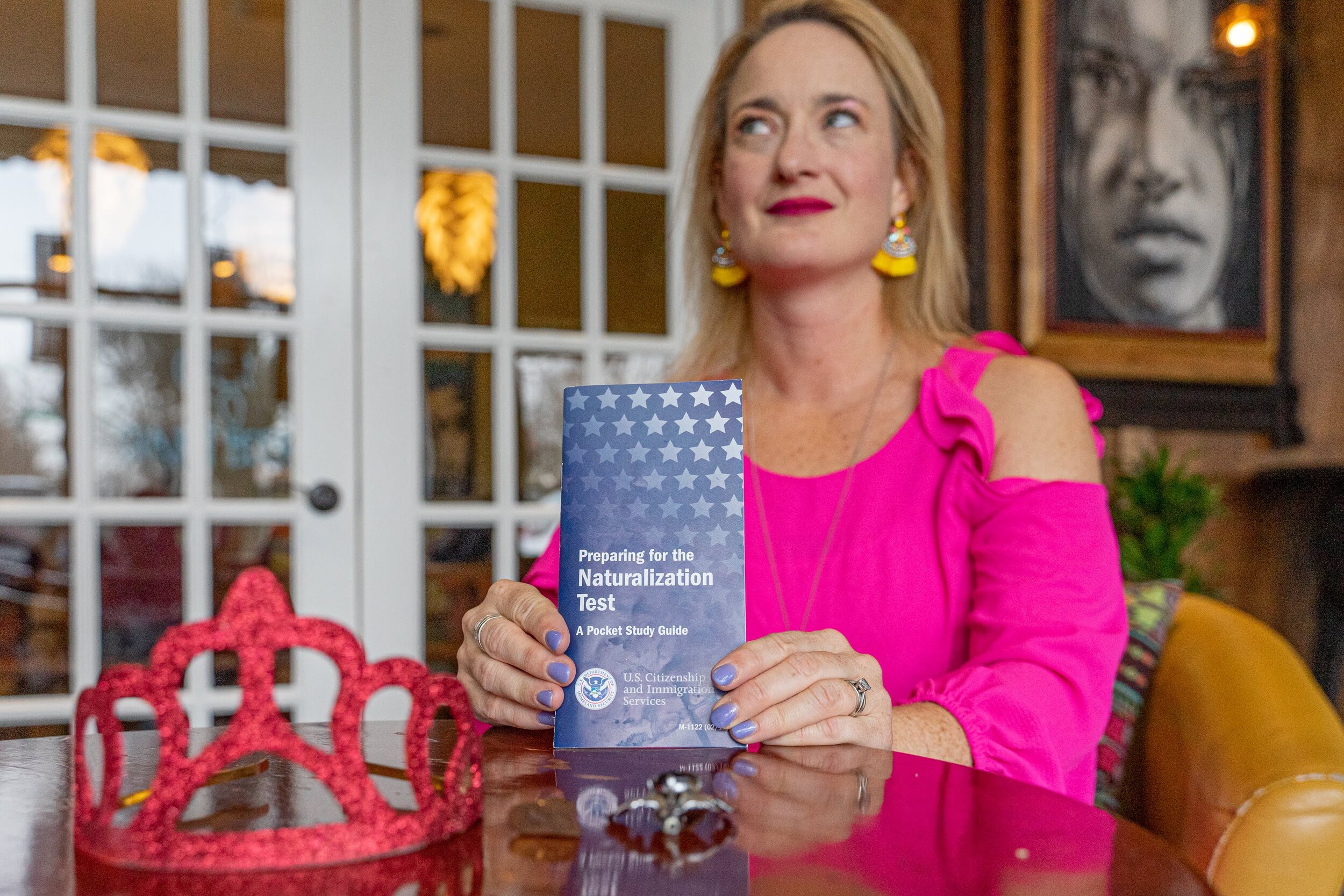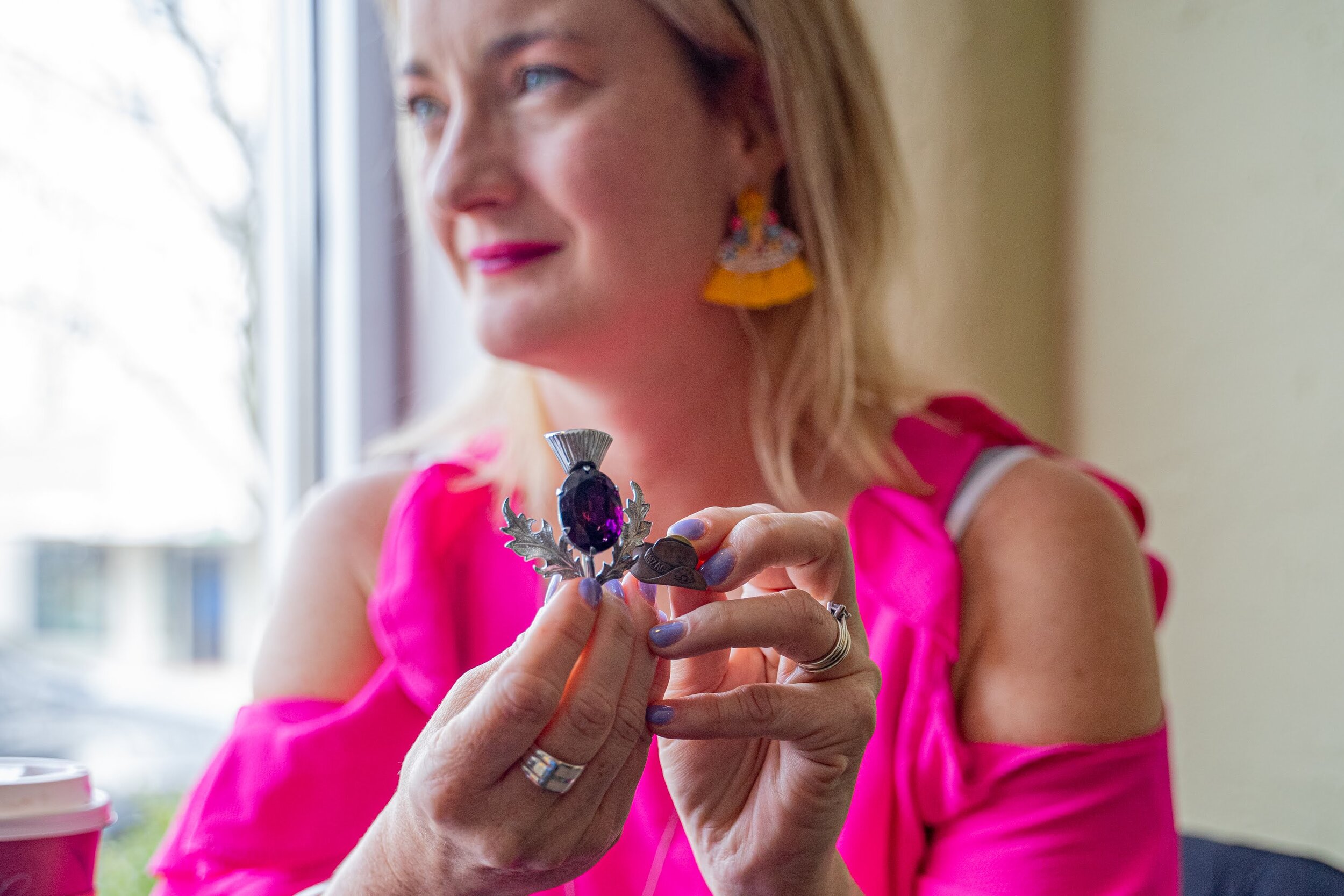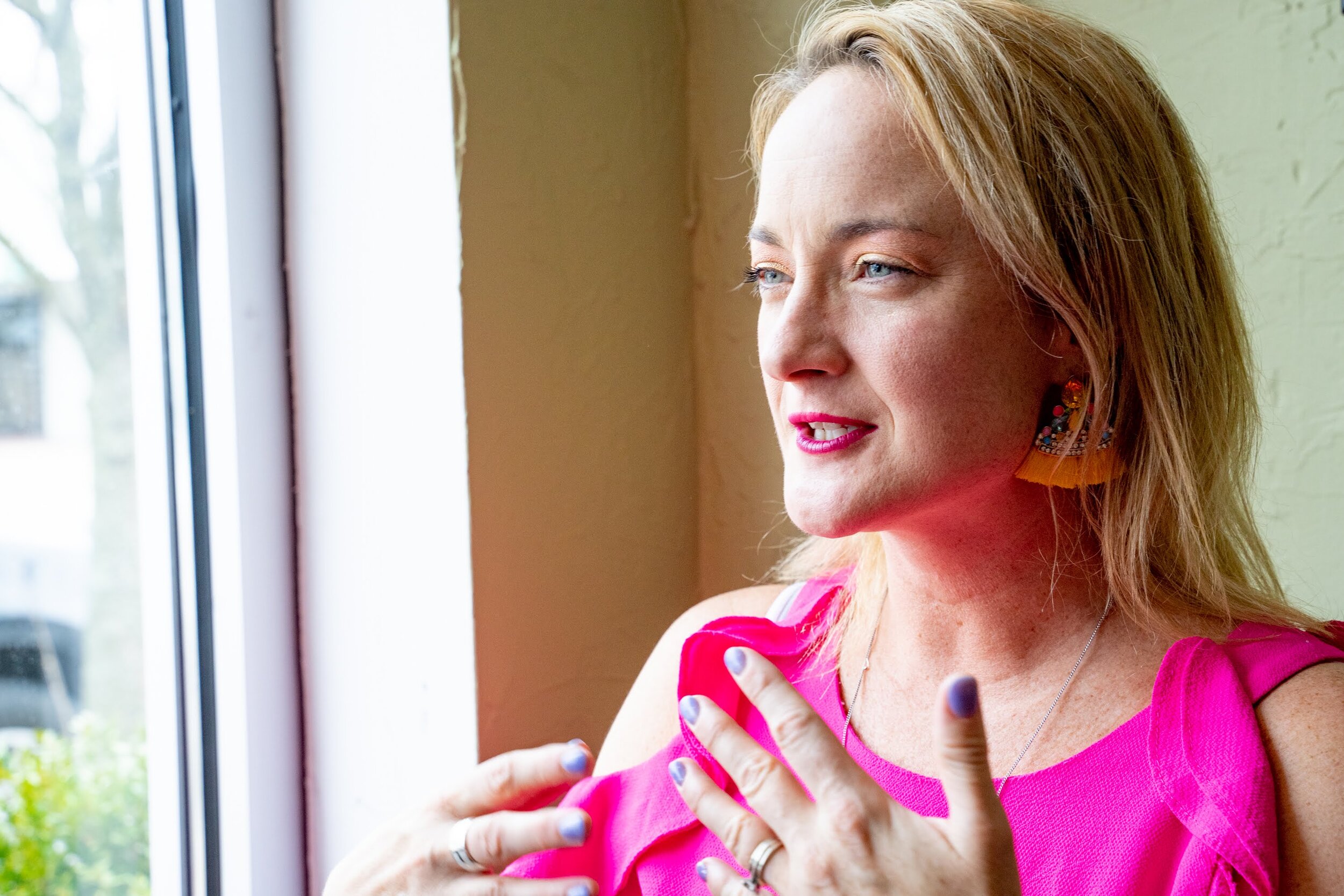Home Away from Home: Claire Stewart
When you hear the word "immigrant," what picture does your mind conjure up? Whatever that picture is, I bet it's not a blue-eyed, blonde-haired, Australian dancing queen.
We met Claire Stewart at Lola's Coffee House, in February – pre-COVID-19. Lola's, she would tell us, is her favorite Coffee Place in Cincinnati. She loves Lola's, "because apart from Australian coffee, Lola's has the second-best coffee." Apart from her love of coffee, and her husband and son, her love is the Cincinnati dance group the Red Hot Dancing Queens, which she founded in 2015.
You might have seen the group in parades around Cincinnati and Northern Kentucky. It's the most colorful dance group in the region, with people of different body composition, race, ethnicity, sexuality, gender, and profession. The dancers wear red hot make-up, always accompanied by a vibrant red crown and an individual rainbow outfit. The whole set-up just looks like a bevy of beautiful divas having the time of their lives. Claire Stewart did that. An ordinary immigrant woman, who like the other immigrant women before her, her finding home story includes a whirlwind romance across the oceans that spanned 17 years.
Interview by Clara Matonhodze Strode. Photography by Emily Palm.
Let's start by finding out who Claire Stewart is.
I am an Australian who has traveled and lived in many places until we decided to make Cincinnati home. It will be five years [as of March 2020]. I have contributed to the community in different ways, met terrific people, and I'm kind and loving. I started Red Hot Dancing Queens, which is unique in Cincinnati. So that's who I am; I'm kind, I'm generous. I'm thoughtful, and I really want to make Cincinnati a great place to live.
Where did you grow up? Tell us about your hometown.
I grew up in Melbourne, Australia. It's the second biggest city in Australia. There are over five million people that live there. I grew up in a bush suburb, a neighborhood surrounded by lots of greenery – like parts of Anderson Township. Melbourne was recently the most livable city in the world for seven years in a row. It's very multicultural. The culture and food are spectacular – the best coffee in the world. Since we lived in a bush suburb, I grew up playing in the forest and at a nearby goldmine that gave me lots of adventures with my friends.
For those who don't know, what's the racial make-up of Australia?
Australia is diverse. It has people in governments that have different skin colors, different names, different backgrounds could be first, second, third, sixth, 10th generation. In America, you have to be American-born to be president. Well, Australia's first female prime minister was actually born outside the country. There is the representation, but you know, there can be more.
The most significant racial issues we have are with the aboriginals. For years, the country celebrated Captain Cook, who was the first Englishman to settle in Australia. He claimed he “discovered” Australia, but we know the indigenous aboriginals were already here, so that celebratory day, January 26, became controversial. I mean, the indigenous aboriginals were living on the land for over 60,000 years. There is a shift, though, as Australia becomes more diverse. Some years ago, the government did apologize to the indigenous aboriginals for all the atrocities that happened. Australia has a reconciliation week and Sorry Day. Still, I acknowledge and support the indigenous, and it's absolutely their right to feel that way.
I think my future is to continue to be happy, spread joy, and help people.
How did you celebrate the holidays with your family?
Our holidays were pretty standard but different compared to how we celebrate here. I have memories of being at the beach and celebrating with friends. We would have barbecues at the beach in January because Australia is hot in the winter months. We celebrated cultural holidays, but one is still controversial because we were celebrating the British colonizing Australia. Nevertheless, you know, as a child you're just having fun. You don't think about the politics of these celebrations. In June, we celebrated the Queen's birthday even though her actual birthday is in April. I feel, as Australians, we just wanted a holiday to break up the monotony and decided we will celebrate the Queen's birthday in June!
November, we celebrated horse racing, and it is an actual holiday – like the Kentucky Derby. Melbourne has quite the horse racing scene and season with the Melbourne Cup. We would all get dressed up and go to the races. I guess the most different thing for me is Christmas. Christmas in Australia is hot, and so we celebrate it outside, unlike here. We would go to the beach and eat B.B.Q. and salads and drink.
How did you meet your husband?
So, we met in 1999 when I was an international camp counselor. His sister was a summer camp counselor at the camp in Wisconsin (he went to the brother camp when he was of school-age). Nothing happened at the time, but we did develop a friendship before I went back to Australia. I went back to camp the following year. Nothing happened. The first year I was in Wisconsin, I met him at camp pickup of campers in Chicago. Then the second year he was in town for his 10-year camp reunion, and we ran into each other in a bar. I was single, but once again, nothing happened. Years pass, and we reconnected. I attended the reunion, and we reconnected once again. After that, everything is history. We're meant for each other because from the time we met to us finally getting into a relationship, it had been eight years – some spent connecting over the internet because it had come alive.
Did you get married first and then move to the U.S.? Walk me through your decision-making process to leave the outback and settle here.
Well, I knew he was the guy for me. I was like, wow, this is good. I was 30 when we reconnected. Remember, I had known him since I was 21. We three weddings; including one in Melbourne, and then we had a wedding party in Chicago. We were married because I knew this relationship was so important, and when it's love, you don't want to be apart. We just did not want to be apart, so it wasn't that hard to leave, even though it felt like I was giving up a lot, but we wanted to be together in the end. After kissing a few fools, I felt so lucky that I had my best partner to have adventures with. By the time I immigrated, he was in Milwaukee, and then we moved to New Orleans, and then we moved to Cincinnati.
I try not to have regrets because I think they're lessons learned.
As an immigrant woman, even though you pass as American, did you come across any obstacles?
I am blond-haired blue-eyed, and I'm also always having fun, so people don't think I face obstacles, but I do. When I tell people this, they are astonished. Well, I'm a woman, and I'm an immigrant – a double minority. When I tell people this, they usually catch themselves, and I can see then realizing their bias. Then there are the friends who always introduce me as "my Australian friend." There is still something going on. I realized at some point that I am being excluded. It's human nature to stick to those you know, but it causes considerable disadvantages to people like me – outsiders. A popular recurring obstacle is when businesses assume I'm American. The minute I open my mouth to try to explain my ideas and many professional and creative achievements, and everything changes.
Cincinnati is particularly hard in this regard. Access to employment and opportunity is really very difficult as an immigrant – a minority. I know that Clara, you and I have been in groups where we're trying to make a change, give ideas, and all thoughts are welcome but never acted on. I always say to people, "Look at the Cincinnati city council." A large percent of the city is African American, but does the City Council representation support that? And then Cincinnati says it's making a difference celebrating and welcoming immigrants, but from where I'm looking, immigrants help each other because outsiders are not welcomed the same and not treated equally. I have to give thanks to immigrants in the cities I've lived in because they were the ones that helped. They understand what it's like to have walked in your steps – having to leave loved ones, their homes, everything.
There's definitely the solidarity of a shared experience. How did you overcome the obstacles?
Well, I'm with someone who loves me for my values and my ethics and my joy for life and adventure. My husband loves and respects me for who I am. My husband is a fantastic support system that I'm fortunate to have. He also understands everything I've given up, and he doesn't deny that. He supports everything I do and embraces me. We go to Australia whenever we can. We have Australian food in the house, which helps because I lean on him.
You talk of your husband understanding what you have given up. What have you given up?
He understands that I have given up the convenience of being close to my family. The ease of college being affordable and having healthcare and safe schools for everyone. He understands I will always be an immigrant because I'm not from here. I don't have the connections. I don't have the support. I don’t have the equal opportunity, because you're just always the outsider. Don't get me wrong, America's great, but it's hard to compare the gun culture here, and the "people matter" attitude of Australians. It goes back to that understanding that just like you, we have a purpose, and one mission in our life. Just like you, we come with love in our hearts, and we want to make our family and friends happy.
Still, it's hard just to get that person who believes you are capable and offers to pass your resume around and offer you a job. All this is somehow gone because it takes a really long time to build relationships in a community. You lose all that when you move. The high school or university friend who might help isn't there.
What I want is just an acknowledgment that all we want is purpose and community, and the equal opportunities that come with it. It's hard to get that as an immigrant or a minority. I know I'm blonde-haired with blue eyes, but I've had those battles, and I don't think people realize that. I'm going to be honest about it and say I'm easily dismissed because I'm Australian with an Australian education. I have a green card to work, but the lack of employment opportunities in this region given to myself and other immigrants (who are just as qualified or more) has been mind-blowing. So yeah, I have given up the comfortable life that comes with familiarity.
Do you have any regrets?
I try not to have regrets because I think they're lessons learned. If anything, maybe I regret that I didn't start traveling earlier. I miss my parents and friends every day of the week – I miss the hugs. I miss Australian food and culture, but do I regret it? If I did, I wouldn't be sitting here with you! I wouldn't have my son or my amazing husband. I just think, as people, we ought to keep moving forward. I have some really amazing friends; I wouldn't have otherwise. I regret not doing something sooner, maybe. I think my future is to continue to be happy, spread joy, and help people.
What makes you proud despite all the heartache? I have asked women I have talked with to show me what gives them the strength to keep going. Everyone has their object of power. What is yours?
I've got multiple sources, but at the end of the day, I'm proud of running a non-profit. I'm pleased to have started Red Hot Dancing Queens and bring joy to many women and men. I have been told so often that, "Claire, thank you for changing my life and welcoming/helping me." I'm proud of what I've achieved with that dance group, and I know that I have done something that Cincinnati never did, so I'm glad I've added to the art space. I know that parades are more shiny and bright because of us. I know that people have become friends that never would have been friends. That is my positive contribution, and it makes me happy.
“Home Away from Home” is Clara Matonhodze Strode’s monthly column celebrating immigrant women who now call Cincinnati home. Nominate folks for Clara to interview here.






